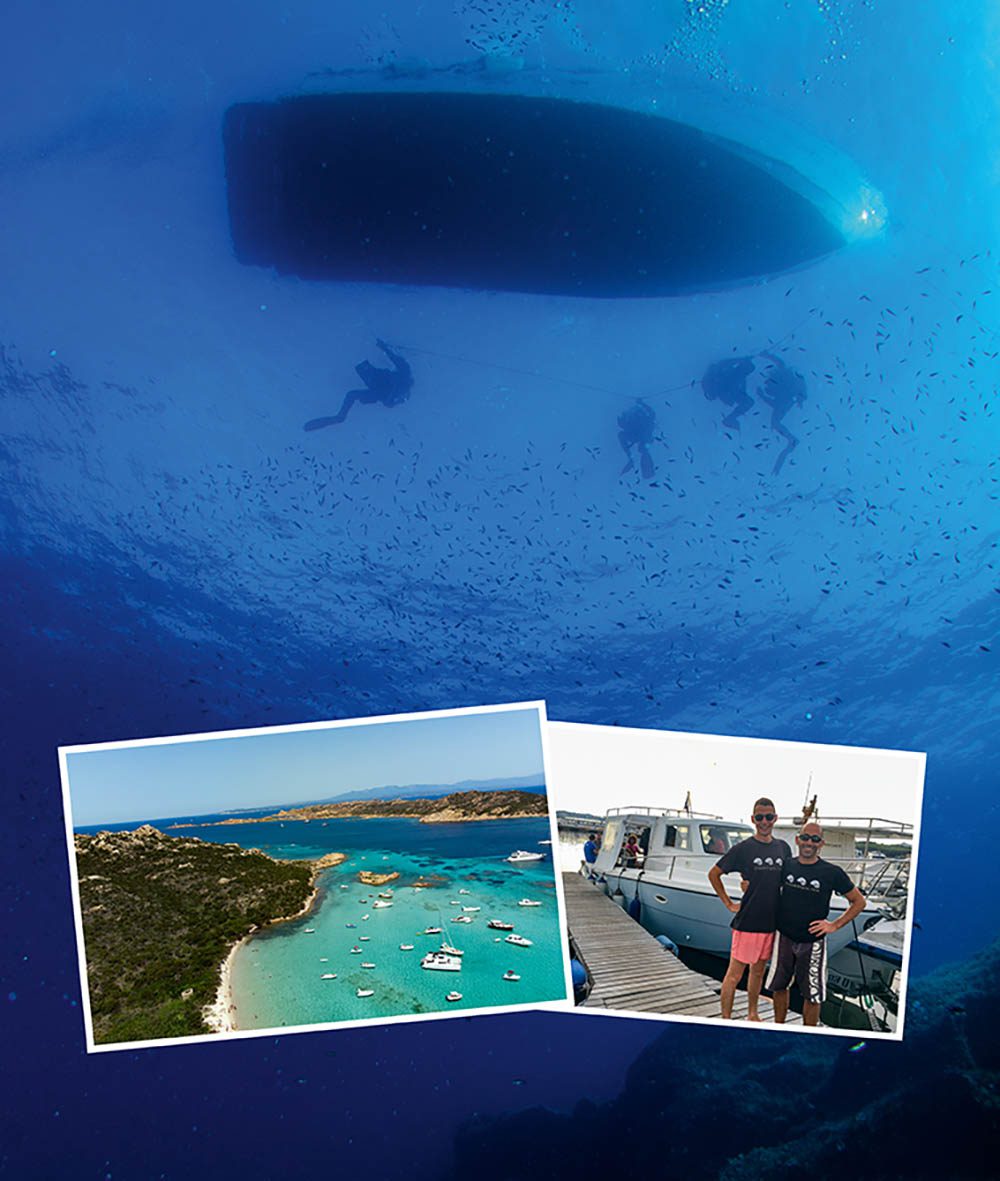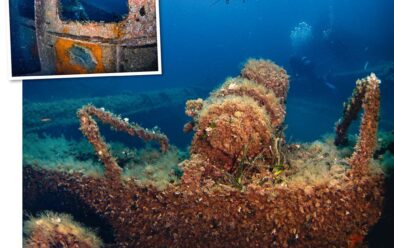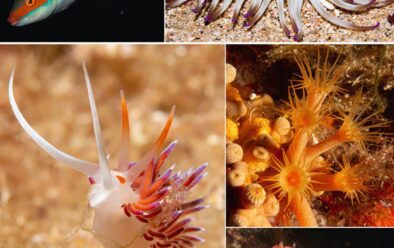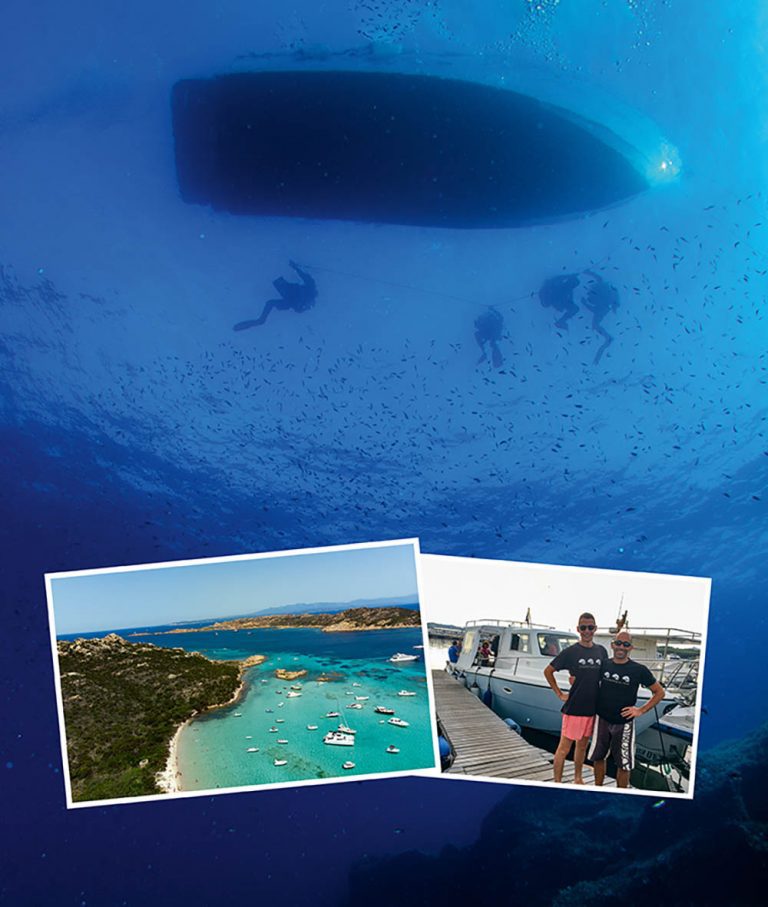SARDINIA DIVER
Sardinian Surprise
The Med had been a bit of a blind spot for Lisa Collins – and it’s possible that she has now been a tad spoilt by her first experiences there.

Inset left: View over La Maddalena Archipelago – not so unlike the other Palau. Inset right: Alex and Vinny of Nautilus.
Appeared in DIVER October 2019
As we crested the hill, the scent of wildflowers strong in our nostrils, butterflies flitting around, we stared at the view below in awe.
Edged by the most vivid blue and turquoise seas, we might have been in Micronesia rather than the small town of Palau in northern Sardinia. We were to spend a week exploring these vibrant seas with Dive Sardegna’s Nautilus Dive Centre.
Cooled by a slight breeze, we watched as dive-boats, sailing boats, small craft and super yachts bobbed in the harbour or left white trails across the channel between Palau and the islands in the La Maddalena archipelago.
La Maddalena is a group of six main islands encompassed by a national park (both marine and land), reaching from a mile off the Sardinian coast at Palau to the tip of Corsica, some eight miles north.
My partner and dive-buddy Mateusz had visited the area 10 years before, and had always wanted to take me, knowing that I would love the scenery.
Was I happy to finally see what he had described! I hadn’t believed that the sight of Mediterranean water could be so breath-taking.
We drove down to the town and found Nautilus’s new shop near the car ferry servicing La Maddalena, where some 3000 people live.
Co-owner Vinny had been born in Italy but grew up in the UK, he told us, and his wife Steph was Swiss. They had spent many years working in the Maldives and Indonesia, helping to discover dive-sites in Raja Ampat while working at Max Ammer’s first resorts on Kri and Wai islands. They had been on Wai when the locals, objecting to the European diving invasion, burnt the resort down.
Falling for the beauty of Sardinia and the diving around Palau and La Maddalena, when they found a small dive business for sale it had seemed a match made in heaven.
They had developed the company into the only PADI 5* Gold Palm Resort and BSAC Resort in Palau, and were justifiably proud of it.
Next morning, with Vinny out captaining the dive-boat, we met Steph – “the real boss”, as her husband had called her – and found out more about the area.
The 20,000-hectare national park, formed in 1994, contained many endemic species, we heard.
Most of the islands were uninhabited, and the only town in the archipelago was on the main island of La Maddalena.
This had been a strategic stronghold for both Napoleon and Nelson, and remains of historic fortifications from various periods are dotted everywhere.
During the Cold War, the island of Santo Stefanio hosted 1000 US naval crew and their submarine base. Before leaving, they had said thank-you by planting a forest of pine trees around Palau.
The dive season ran from April to November, and the centre was able to dive almost every day, said Steph.
With around 40 dive-sites from 5-60 minutes’ boat-ride away, sheltered sites were usually available. If the mistral from the north-east was blowing, they would dive the east side of the islands, and if the wind was from the west, they dived the islands closer to Palau.
Fortunately the forecast was for light wind, calm seas and sunshine.
We mentioned Vinny’s comment about Steph being boss and she burst out laughing, confiding in us about her husband’s secret clothes addiction. They clearly loved working together, and shared a real passion for their company.
At 7.15 the next morning we met Vinny at the custom-built 11m dive-boat Selamat Jalan, moored in Palau’s main harbour.
Vinny’s briefing on the boat described a large round rock surrounded by smaller rocks.
As Alex led us down 10m to the top of the rocks, I realised that the site was much larger than I had expected. In the 25m-plus visibility it extended far beyond my vision, looking as if a giant had knocked over his oversized Jenga bricks.
Mateusz spotted a colourful flabellina nudibranch, then Alex showed me a cut through the rock going down to around 20m.
I sank slowly to hang just above a thermocline layer at 14m. The sheer wall was covered in algaes and colourful orange sponges, tiny yellow tube sponges and tubastrea cup corals. White and pale pink algae clung to the rock like clouds of candy floss.
Mateusz descended towards me, finding two more other nudibranchs and red starfish on the way. As we followed Alex through the cut, my temperature reading was down to 17°C, as favoured by sea slugs, which were everywhere.
Around a corner we startled a big dusky grouper, which quickly slipped away. Vinny had said that there were many shy grouper on the northern side of the rock, usually at around 30m, so we were lucky to see this one.
At our deepest point of 24m I saw some small white seafans. Alex pointed out a sea bass with bright blue belly. Mediterranean rainbow, peacock and ornate wrasse fed on the reef, along with many two-bar and sharp-snout sea bream.
Schools of damsel and cardinalfish filled every crevice. And on the ascent a school of barracuda were circling in the shallows, which would be a regular feature on our dives.
We were hoping to dive a large wreck called the Angelika outside the national park to the north, close to the deep channel between islands. The site depended on wind and weather and could be prone to current.

We had expected our second dive that morning to be close to La Maddalena but Vinny winked at me – he was trying for the Angelika. The wind had dropped slightly and was expected to stay that way for the next hour or two.
Forty-five minutes later, Alex released the anchor a short distance from the rocky outcrop that the 102m cargo vessel had struck before sinking to 28m in 1982.
Surface-swimming a short distance towards the rocks, we descended just before the wreck. Alex checked the anchor and set it under a large rock. In the slight swell, it was important that it was secure.
The wreck lies broken in many pieces, some so covered in algae, corals and sponges as to be indistinguishable from the rocks. The “bones” are strewn everywhere. Large parts remain intact but show signs of a violent ending.
The wheelhouse was weirdly intact, a vertical ladder leading up to a gangway and into a doorway. As Alex swam up the ladder into the wheelhouse, I could imagine the crew doing the same.
Following him in, I saw a fusebox on the wall. In the next room, the square box where the controls would have been was now open at the sides, cables and wires tangled inside. On the tip of a wire, Alex’s torch lit up a purple flabellina.
Large cogs and pilings lay scattered on the rocky seabed. Swimming back towards the rocks, I noticed the anchor-chain, rusted orange.
Vinny wanted to show me Motore the next day – actually the engine-block and propeller of a crashed WW2 fighter lying in the sand at almost 30m to the north of Spargi Island.
Many bids have been made to find the rest of the plane but all have failed.
As we followed Julie our dive-guide down across the rocks and expanses of seagrass between the boulders, we again found many nudibranchs, and several red scorpionfish. Mateusz was happy to find a tiny male black-faced blenny, boldly ready to pose. He then spotted a female close by, differentiated by not having a black face.
Julie pointed out the tiny and very pretty mermaid cup algae – little white cups on stalks – endemic to La Maddalena.
Heading slightly away from the rocks, we could see the propeller a fair distance away, visibility again around 25m. A small anemone lay in the sand beside it. The bright colours of the sponges, soft coral and algae made the blades and engine look beautiful, set against the bright blue ocean with the sunlight streaming through.
As we returned to the mooring line, Julie signalled to show us a sting ray swimming away in the distance, and a barracuda school near the surface.
As we approached the dive-site Secca Washington, in mid-channel between Spargi and Budelli islands, we could see two large rocks some 5m below the surface.
Keen to be first in the water to explore, we followed Julie down the mooring-line to find that the rocks were like pillars on top of a plateau of large flat rocks lying on top of each other.
Julie had explained that the site was massive, almost connecting Spargi to Budelli and stretching from 5m down to 30m on the sand. We would dive only a small part of it.
The marine life was prolific. We descended in the centre of a school of small fish. Tubastrea cup coral seemed to cover most rocks. A school of two-bar bream, interspersed with dentex, grouped together in a cut in the rocks.
Julie pointed out a moray eel just before we followed her into a swim-through, the rock walls covered in sponges and many nudibranchs. Emerging, we found several dusky grouper and one huge gold-speck grouper resting under an overhang.
These fish don’t usually allow divers near but, moving very slowly, I managed to get quite close to the gold-speck.
Stephanie had told us that a must in Palau was a day-trip on one of the many boats in the harbour to visit beaches around the archipelago.
We joined her recommended boat, owned and captained by Franco of Palau Blue Tours, and spent a perfect day swimming, snorkelling, enjoying local cheese, salami and olives from Franco’s own grove as well as a tasty fresh pasta main course, all washed down with plenty of cold northern Sardinian white wine.

For our final day’s diving, we couldn’t have asked for better weather. The sea’s surface was mirror-calm as we approached the dive-boat, with just the slightest hint of wind. Vinny looked excited.
It had been the best weather for some weeks, so he had decided to make the 60-minute trip to the northernmost part of the marine park, Lavezzi island in Corsica.
There were a few more divers than our normal 10-12 that day, so Julie would accompany the dive-boat in the RIB with three more divers.
Enjoying the early-morning sun on the top deck, we chatted to Swiss diver Frank, who visited Sardinia regularly.
He usually dived home lakes and rivers, so appreciated the warmth of the Med, but it was also his view that the marine park at La Maddalena rivalled and exceeded many more tropical destinations.
Vinny chose Secca di Ponente as our dive-site, telling us about the unusual brown and sargassum algae normally found there but rarely seen elsewhere.
The site went down to 40m and was, he said, favoured by technical divers.
The lovely Brittany, from the east Midlands, was our dive-guide, carrying out her first dive at the site.
The beauty of the rocks astounded me. It looked like a fairy-land, coated as it was in a swaying mass of small individual algae plants like cotton wool, bright green sargassum weed and brown wispy algae, and dotted with mermaid cups and white cup coral. Dentex and hundreds of brightly coloured wrasse swirled about.
As we went deeper, purple and orange gorgonian sea-fans grew all over the rock face. Orange and yellow cup coral, red, orange and bright blue sponges vied for space among the algae.
Sizeable white and red starfish clung to the walls of rock, and nudibranchs and flatworms competed with their colour and patterns. The colours were incredible.
I didn’t want the dive to end but, down to 50 bar, I reluctantly signalled to Brittany and we started our ascent.
As we moved up over the rocks, eight beautiful fish I had never seen before schooled around the rocks.
Smooth and shiny, yellow in colour with brown fins, I found out later that they were sea bream, which have a pearly structure in their foreheads through which they make a whistling sound.
Vinny was very happy when I shouted to him that the gorgonians were back. Before the dive he had told me that unusually warm waters had seen them off the previous summer.
Our last dive was back at Secca di Spargiotello. I made my giant stride entry, expecting the usual cold impact, and was pleasantly surprised to find the water warmer than before – a balmy 23°! It was finally starting to creep up towards summer temperatures.
The site looked beautiful in the calm conditions, sunbeams hitting the rocks and the rainbow wrasse. There seemed to be many more fish than on our last dive there, perhaps attracted by the warmer temperatures.
A school of barracuda spun circles near the surface, seeming to follow us around the site.
Fewer nudibranchs were visible now, though I did see two very large white ones with brown spots on a sponge.
Brittany also spotted a bright purple flabellina waving about on the end of a piece of algae.
At 22m we found a group of very shy grouper. I managed to get quite close to one of these large fish, gaining its trust to the point that it would actually make slight movements in my direction.
As we went up, reluctant to surface, I spotted a reef octopus wedged into a hole. It had been feeding on small crabs, leaving their discarded shells close by.
Following such impressive dives, we could only wish that we had booked a much longer trip to Sardinia, to enjoy more underwater experiences with Vinny, Steph and the Nautilus dive team.
FACTFILE
GETTING THERE> BA flies direct to Olbia from Heathrow. Other airlines fly direct from other UK airport. Car hire is advised to explore the region.
DIVING & ACCOMMODATION> Nautilus Dive Centre, divesardegna.com, can help with self catering accommodation or try the family-run 3* Piccada hotel in Palau.
WHEN TO GO> April-November. July and August are the warmest but also the busiest months. June to early July and September are considered ideal. Water temperatures range from 14°C in February to 25° in August.
MONEY> Euros.
PRICES> Return flights from around £200. A week in a Piccada double room from 175 euros pp. Ten-dive package with marine reserve fees 395 euros. Palau Blue Tours day-trip 85 euros pp, palaubluetours.com
VISITOR Information> sardegnaturismo.it/en

